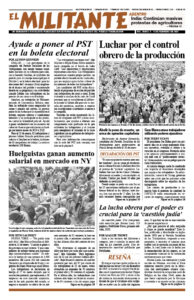AUCKLAND, New Zealand — Dozens of home-care workers and their supporters picketed Lifewise services here Jan. 23 against the employer’s attacks on hours and wages and in support of the workers’ demand for a union contract.
The E Tu union action helped kick off a three-day strike. The workers are protesting the bosses’ notice of a two-week February lockout, targeting the 78 union members who took part in six days of strike action in December and earlier this month.
Lifewise services, a division of the Methodist Church, employs 100 workers who provide care for the elderly and disabled in their homes.
The lockout threat is an attempt to “stop us from being in the union,” Anita Apa told this Militant worker-correspondent. Like many on the picket line, Apa has worked for the company for over a decade.
The workers are fighting to restore full-time working hours, which they say the company took an ax to after being forced to increase their pay in 2017. This followed the victory of the union’s national “pay equity” claim that compelled the government to increase wages by 15% to 49% for 55,000 care workers, depending on a worker’s skill and experience.
Union workers at Lifewise have seen their clients and hours decline, as the company “hires newer workers at a lower rate,” Rose Fusimalohi told the Militant. Shop steward Helen Taufa said, “They hire people at a starting rate of $19 an hour” ($13.57). Then they strip hours from workers who are entitled to NZ$25.90. Some members of the all-women workforce, which is made up largely of Pacific Islanders, are “only guaranteed 10 hours a week,” she said. Union fighters only found out about this through discussions with new hires during the current dispute.
“And whoever was hired after pay equity gets 50 cents per kilometer petrol money [58 cents a mile], when those of us hired before are paid 70.”
“I signed up for a full-time job, but that’s not what I am getting now,” said Christine Faga. “It’s hard to manage your bills like that.”
“There is no time to spend with the clients as human beings, and we are not allowed to have a cup of tea or lunch with them,” Debbie Savage said. “I have to sit on the side of the road and have lunch while I’m waiting to see if I get called to another job.”
“I feel good about striking,” she said.

